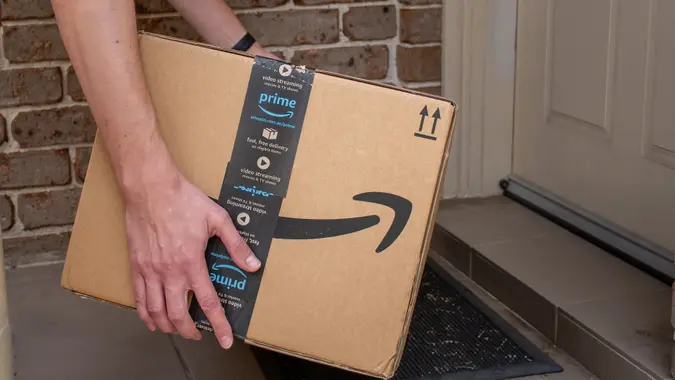Empowerment Journey Step 3

Our journey has begun. You are working in a field that interests you and making enough money to cover basic needs like housing, food, and transportation. You may not realize it but there is a crucial juncture approaching – a “fork in the road” where you will start down one of two paths, each with vastly different terrain. The graphic above is a visual representation of this stage in our empowerment journey.
One criteria will determine key aspects of your life such as where you live, how your children grow up, and whether or not you take vacations.
Can You Live on Less Than You Make?
If you can, it allows you to put the extra into savings, and eventually into investments. This is GOOD because investments are the way to build wealth over time, as we’ll discuss in another post.
If not, you will probably accumulate debt. Debt is BAD because it’s difficult to repay, and diverts money that could otherwise go toward savings/investments.
People who build wealth pass this test while those who struggle with money often do not. Most if not all personal finance tips can be distilled down to this fundamental concept, for good reason. The Millionaire Next Door was written in 1996 by two researchers who gathered data from thousands of wealthy people in order to determine how they built their wealth. They found seven common factors among them, and guess what was number one?
“[People who successfully build wealth] live well below their means”.
[Mentally] Simple, Not [Emotionally] Easy
Ok, so we just need to live on less than we make, and we’ll succeed with money – it’s that easy? Warren Buffett, the world’s most famous investor said “investing is simple, but not easy”. This concept applies to other important aspects of life such as eating healthy or exercise. We pretty much know what we “should” do: eating a donut instead of oatmeal and fresh fruit likely won’t help us get fit. But there is a case full of donuts that are only $1 each at staring at you in 7-11 that you can grab and scarf down in two seconds, whereas healthy food is often less convenient and/or more expensive. Our lives are busy and we take the easy road for the sake of our wallets and our schedule – at the long-term cost of our health.
In a similar way, we know we should save for a rainy day, but knowing that doesn’t help much when we want to go out to dinner but there is little money in the bank. Or our co-workers have better cars than we do. Or when friends are planning a vacation somewhere you’ve always wanted to visit, but aren’t sure you can afford. We all want to feel successful, and in our society, spending money is (rightly or not) associated with success. Credit is widely available and it’s dangerously easy to turn to credit cards or loans when we’re low on cash instead of learning to save money.
We’re in a constant battle between our minds (“I should save money to prepare for the unexpected”) and our emotions (“I’m older than him, but his car is nicer. What am I doing wrong?”) News flash: unless we actively work on these things, emotion beats intellect every time.
The Stakes: Your Dream Life
“Finance” is a generic, boring word. Let’s be specific about what we are discussing: money YOU earned because you helped solve a problem for society. You produce a product/service or you help people find, evaluate, purchase, sell, or use products/services produced by others. Whatever it is, your efforts created value for someone, and you got money in return. This money you earned can, in turn, create more value for you in the future through savings and investments, or you can just spend it all now.
Most people who are wealthy didn’t get there from their job income alone; they made some sort of investments along the way – real estate, stocks, started a business, something. Investments allow your money to work for you, growing without you having to do much. Employment income, on the other hand, requires consistent time and effort; physical, mental, oftentimes both. These are in limited supply (none of us are going to live forever). Indeed, investments often last through generations if managed well. This is one reason wealthy families tend to remain wealthy.
So the primary path to building wealth is investing, but in order to get there, we need to have money to invest, which won’t happen if we spend everything we make. It is very tempting to rely on credit cards to buy things we want when our paychecks run out, but doing so means that, later on, we’ll be paying Visa instead of paying ourselves via investments. Spending everything keeps us poor.
I call my philosophy “financial empowerment” because it speaks to taking meaningful action and doing things that improve your life, instead of ones that don’t. Because this is such a crucial moment in our journey, we have to have a sense of what’s at stake to make the right — the empowering — decisions. If we don’t find a way to live on less than what we make, it’s unlikely we’ll build wealth, and therefore unlikely we will live the life we’ve dreamed of. Remember this when you’re tempted to spend every penny.
Anxious Spending (!)
When you have money, it’s easy to find things to spend it on. People will take it all and then some if you let them. You must decide whether you will hand over control of your money to others who didn’t work for it, or if you will determine where that value is directed. This is the fundamental decision, and again it’s a simple one, but a few different emotions can trip us up with regard to spending money.
A big one is social anxiety-driven spending – “if I don’t have ___ they will think I’m [insert your biggest fear – poor, unsuccessful, unattractive, etc.]” Humans are social beings, and there are thousands of years of evolution behind our wanting — NEEDING — to fit in with the broader group. But spending money to meet your family, co-workers, or people on Instagram’s criteria of success is equivalent to handing them the keys to your financial independence. We can’t control how people think or feel about us regardless of whether our car costs $10,000 or $100,000.
A related form of anxiety spending is fear of missing out (FOMO). “This deal is too good” or “I may not get another chance to buy it”. In my experience (40+ years of buying stuff), 99% of the time, you won’t regret NOT buying the thing. Sure it happens sometimes. On a weekend trip this past summer I saw a cool hat in a store and didn’t buy it. Sort of regretted it later after thinking on it a bit. And guess what? I just went back to that same store and bought the hat. Regret gone in a couple hours, easy.
Now contrast that with the car that I went a little above my budget to buy, and then a lot over my budget because I succumbed to the sales pressure and bought the “extended warranty” (never buying a warranty for anything is a pretty solid life rule). I regretted that decision for months before I was able to trade the car in and get the payments under control.
If you don’t spend the money, you still have the OPTION to spend it later. Once you spend the money, it’s GONE.
Entitled Spending (DANGER!)
Sometimes you may feel, “I deserve ___ and I’ll figure out how to pay for it later.” I can say from experience that entitlement-driven spending can be disastrous. We all work hard for what we want in life, and on some level, sure, we all deserve to have nice things and enjoy life. I mean, isn’t that what it’s all about? Why else are we all working so hard all the time – to be miserable?? No. That’s what makes these types of spending urges so sinister; they are rooted in completely valid, and very STRONG feelings that we all have. Salespeople absolutely know this and exploit it to our detriment.
A few years back I switched jobs and the new gig paid significantly more than what I’d been making previously. A month or two after starting the new job, the front door of my house started to stick, which happened occasionally as the soils in the area were known to shift around. Instead of fixing the door, I decided that my family “deserved” a new, larger house, in a better neighborhood. It’s something my fiancé and I had discussed, as the home we lived in was a small starter home I’d bought when I was single. Our daughter had just had her first birthday, and with her, the two of us and a dog under one roof, the home was “shrinking”. But the mortgage was very affordable, and our budget had room in it.
Starting that new job, and knowing how much more money I had coming in started to breed some entitlement within me though. Didn’t we “deserve” to have more space? Hadn’t I “arrived” with this new big paycheck? Shouldn’t I find a neighborhood where “successful people” live?
We found a house at the upper range of what we qualified for, with over 1000 more square feet that our prior home. It was a nice house, but I realized after running the numbers there was no room in our budget after paying the mortgage and our other bills each month. Our debts started to grow, which in turn put a strain on our relationship. I didn’t feel successful coming home to my big house in a nice neighborhood, I felt like a fool. We were working long hours just to gradually slip further into debt. This stress strained our relationship and it took years for our finances to recover. That’s where entitlement-driven spending got me.
Spending Money Shouldn’t Feel Bad
I don’t share any of this to beat myself up over past decisions, but rather to help others learn from my mistakes, and to remind myself to do better next time. One of my biggest rules around money based on my experiences (good and bad) is that spending money should not make you feel bad! We work hard, spend most of our time with people we barely know, fight traffic to/from work, deal with childcare, school, and the multitude of other battles we fight to earn a living. After all that, why should we feel guilt or fear when spending the hard-earned fruits of our labor? That’s insane, it doesn’t make sense.
When I walked out of the car dealership, realizing I’d gotten talked into spending more than I planned, I felt ashamed of myself and angry. How could I have messed this up? Our money – the value we’ve created for others – should enrich our lives and help us feel more secure, not less, and it absolutely can. But in order to do so, we have to strengthen our resolve and avoid the pitfalls of emotional spending as best we can.
Getting hosed on buying a car wasn’t fun, but now I can recognize those feelings of “money guilt”, and I’ve developed a habit of watching for them when I’m considering a large purchase. If I feel any of these things:
- anxiety
- pressure
- hesitation in my gut
I don’t buy the thing. I walk away, even if the sales person is in mid-sentence. Financial independence is more important than being polite! Close the browser tab and put the phone away. Let it marinate. Remember – once you spend it, it’s GONE. Often something seems alluring in the moment, but I later realized I would’ve rather kept my money.
Money = options
Options = freedom
I like feeling free and don’t want to live with regret. I’ve learned there is nothing – not a nice car or house – that is as valuable to me as having no regrets.
I encourage you to try this as well. Trust your instincts. If spending money on something makes you feel uneasy, it may be your subconscious trying to keep you from making an expensive mistake.
Timing Is Everything
Waiting to buy something until you run the numbers and give your emotions time to cool down is a powerful way to avoid costly emotional spending. Waiting preserves your options by keeping your money in your pocket. Options = freedom.
To get the most use out of money, it has to be there when we need it. As aptly stated by Paula Pant in her fantastic finance podcast, “you can afford anything, but not everything”. We have to learn how to say ‘no’ to many things – and many PEOPLE – so we can say ‘yes’ to financial freedom. To do this we must know what our priorities are ahead of time, and take care of them before giving in to emotional spending impulses. And the biggest priority as we come to this first fork in the road in our journey is to be sure you have something left over at the end of the month to devote to savings, a topic we explore in step 4.
The Road Less Travelled

As you come to this crossroads, consider the famous words of poet Robert Frost:
“Two roads diverged in a wood and I – I took the one less traveled by, and that has made all the difference.”
Society urges us to take the easy road. Eat the doughnut, use the credit card – it’s easier than learning the discipline to build savings. Many people travel the road of immediate gratification funded by debt. But that journey does not lead to freedom or empowerment.
Come, let’s take the other road.
Thanks for reading! Follow me on Twitter to continue the conversation.





